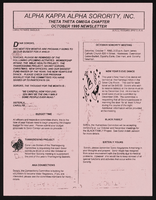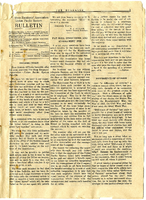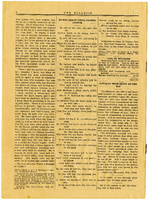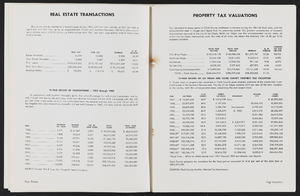Search the Special Collections and Archives Portal
Search Results

Alpha Kappa Alpha Sorority, Theta Theta Omega Chapter newsletter
Date
Archival Collection
Description
From the Alpha Kappa Alpha Sorority, Incorporated, Theta Theta Omega Chapter Records (MS-01014) -- Chapter records file.
Text

Emily McKinley interview, March 1, 1981: transcript
Date
Archival Collection
Description
On March 1st, 1981, Glorialyn Gutierrez interviewed Emily McKinley (b. April 28, 1930 in Las Vegas, Nevada) about her life in the Las Vegas Valley. McKinley begins by speaking about her childhood, her siblings and her extended family. McKinley gives a variety of anecdotes about being raised in Las Vegas, her family’s economic hardships and the house she grew up in. Lastly, McKinley talks about the businesses she owned with her husband, their hardships and her time working multiple jobs.
Text

Eric Calvillo interview, June 18, 2019: transcript
Date
Archival Collection
Description
Interviewed by Monserrath Hernández and Laurents Bañuelos-Benitez. Eric Calvillo was born into a Mexican American household in San Jose, California in 1980. As he recalls, it was there that his fixation with the colors and recurring themes of his family's Mexican roots told hold of his imagination. Today, this is core to his growing art career. Art has not been his sole ambition. Before moving to Las Vegas in 2005, Calvillo attended a San Francisco culinary school. He relocated to Las Vegas to complete his culinary internship at the prestigious Picasso restaurant at the Bellagio. Eventually, he began to pursue a professional art career as a painter of Día de los Muertos motifs and beautifully portray the Mexican tradition of celebrating the lives of the deceased. Through his use of acrylics and oil on canvas, Calvillo conveys the emotion of his culture and then, being a skilled carpenter, crafts his own frames.
Text

Transcript of interview with Eldon Cooper by Kamal Whilelm, March 3, 1975
Date
Archival Collection
Description
On March 3, 1975, Kamal Wilhelm interviewed Eldon G. Cooper (born 1922 in Overton, Nevada) about his experiences in Southern Nevada. Also present are Cooper’s wife and several unnamed adults in the background. Cooper first talks about his background and his eventual move to Las Vegas before describing the recreational activities in which he and his family took part. He later describes the atomic testing, environmental changes, modes of transportation, social changes, and tourism in Las Vegas. Cooper also discusses the Stewart Ranch, and his wife describes the setting of multiple photographs taken of properties in the Downtown Las Vegas area.
Text

Transcript of interview with Ralph Denton by K.J. Evans, approximately 1999-2000
Date
Archival Collection
Description
On an unknown date (likely 1999-2000) and time, K.J. Evans interviewed Ralph Denton, an adviser to former Governor Grant Sawyer and political figure in Nevada for many years. Denton first talks about his personal friendship with Sawyer, their education in law school, and his eventual work on campaigning for and working with Sawyer after he became governor. Denton then explains the controversy regarding Denton’s accepting of complimentary services (comps) at hotels. He later describes his work as a Clark County Commissioner and then talks about working as district attorney in Esmeralda County, Nevada. Denton then talks about the influences that led him to be interested in a career of law and later speaks more about working with Grant Sawyer, specifically about serving as his adviser, afterwards providing the argument on why he believes Sawyer was the greatest governor of Nevada. Toward the latter part of the interview, Denton describes his work on improving civil rights and some of the challenges that came with that. The two also discuss how the practice of law has changed over time. To conclude the interview, Denton describes his experience in running for governor and how he would have served as governor if he had been elected.
Text





